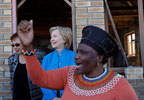
Goma, DRC – When a prominent figure like Secretary of State Hillary Clinton comes to a town like Goma in eastern Congo, many people want to use the opportunity to get their messages across. Goma has been a conflict zone for over a decade, so her visit was deemed a sign of U.S. involvement in the region and gave hope to many actors on the ground.
But the official reason for her visit was to tackle the issue of sexual violence that has been plaguing the region largely under the international radar. Following official meetings with the Congolese Prime Minister in Kinshasa and President Kabila in Goma, Secretary Clinton visited Mugunga, a camp for an internally displaced people, which is located just outside Goma.
The next stop was Heal Africa, a hospital that treats victims of sexual violence, where Clinton met with a group of leading local and international NGO representatives. Secretary Clinton opened the discussion with a speech to announce a $17 million pledge to prevent and respond to gender based violence. She announced that the Ambassador-At-Large for Global Women’s Issues, Melanne Verveer, will be tasked with redoubling efforts to address sexual violence in Congo, and provided this initial sketch of what the plan will include:
• The U.S. will dedicate resources to train the medical corps specially to treat fistula.
• USAID will coordinate donations to do with medical care, and legal support will be given to more than 10,000 women.
• The U.S. will earmark $3 million to train police officers to protect women and girls from sexual violence.
• Technology experts will equip and train women to use mobile devices to report attacks.
• AFRICOM will deploy civilian and medical teams to help discover victims of sexual violence.
While the focus on Secretary Clinton’s remarks was the announcement of this plan, she didn’t let the moment pass without speaking out firmly about the abhorrent behavior of the armed groups responsible for the violence and calling on the Congolese government to commit to confronting this endemic problem, in partnership with the US government.
Following these remarks, Secretary Clinton ceded the floor to the NGO representatives, who each offered their perspective on the problem and analysis of what is needed on the ground to deal with the root causes and consequences of gender-based violence, as well as the broader development needs of the region.
As Christine Schuler-Deschryver of V-Day powerfully noted, many visitors come here, take a look at the misery, and leave only a business card.
Among other messages, the participants called for increasing support to end impunity through the creation of mixed chambers, through which a national and international judge would jointly hear cases, and they expressed the need for the international community, including the U.N. peacekeeping force, to be pro-active in its responsibility to protect.
Secretary Clinton expressed great appreciation for the specific suggestions made by people engaged on these issues every day. She emphasized the renewed partnership the U.S. plans to forge with Congo, continuing the theme of President Obama’s address in Ghana earlier this summer. She noted:
I do not want to over promise. I am not just here to leave a business card, but I don’t have a magic wand, either. But what I do pledge to you is that we will work. We will work hard. We will work with your government, we will work with groups like many of you represent. We will work with individuals, the private sector, civil society, to try to help resolve the conflict and provide a better future.
But it is ultimately up to the people here. And I have seen so many examples of courage. I know the Congolese people do not lack in courage. And I know they do not lack in hard work or perseverance or survivorship.
Her message to the broader community of women in Congo resonated. “No matter how long the nights, the day is sure to come,” she said, employing a Congolese proverb, which carries great meaning to women of Congo who live in constant fear of being raped at night and who have not been able to walk safely in their own streets for far too long.
As many news reports about Secretary Clinton’s stop in Goma have noted, this visit certainly had a positive vibe, but what counts is what happens next. The theme of partnership needs to be visible in U.S. implementation of programs that empower locals to take their future into their own hands and confront the causes of the crisis and not only the consequences. Building stronger independent institutions at the legal and military level is a necessary starting point for a lasting resolution of the conflict; Congolese civilians deserve to be protected by their army and through a viable justice system.
Olivia Caeymaex is Enough’s new field researcher in eastern Congo and will be a regular contributor to Enough Said.

